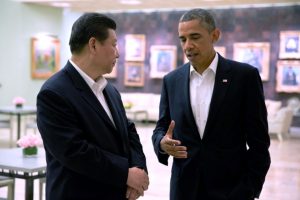As my colleague Ankit noted, U.S. President Barack Obama just signed an executive order that will permit the government to take financial action (including sanctions) against foreign individuals and groups that commit cyberattacks against U.S. interests. The order allows the Treasury Department to freeze the assets of entities determined to be responsible for, complicit in, or assisting the cyber theft of trade secrets for financial gain or competitive advantage.
Given that Chinese firms and the Chinese government alike are frequently accused of such cyber theft, the executive order may well face its first major test from Beijing. The U.S. government has already proven willing to publicly charge Chinese citizens with hacking, but the previous indictment of five PLA officers was purely symbolic – the new executive order could mean crippling sanctions for Chinese firms.
Beijing objected fiercely to the toothless indictment of its PLA officers; however, it’s likely to have a far more vociferous response to sanctions against Chinese firms (if it comes to that). Asked about the new executive order, Foreign Ministry spokesperson Hua Chunying told reporters that “China always disapproves one country’s willful use of sanctions on citizens and entities of another country.” She also repeated China’s customary point that cyberattacks are transnational and “hard to trace back” to their point of origin. Hua said that “China firmly opposes and combats any form of cyberattack,” but that clearly doesn’t mean Beijing approves of the new executive order.
So what might that mean for the U.S. policy? Say the order is put into action, and a Chinese person and/or firm is put on the sanctions list. That will doubtless trigger an angry diplomatic response from China (similar to protests over Chinese firms being sanctioned for allegedly support Iran’s missile program). We can also expect China to once again call off any cyber-dialogues taking place, just as it did after the Department of Justice indicted PLA officers.
More concerning, however, would be the potential for China to launch an economic counterattack. Foreign firms, especially technology companies, already face an uncertain operating environment in China, as Beijing is set on reducing (and eventually eliminating) its reliance on foreign technology. China also punished several foreign firms in an anti-monopoly probe last summer, in a move critics said was designed to give a leg up to the Chinese competition (an accusation that Beijing denied). If China wants to hit the U.S. back economically, it could ramp up the pressure through more investigations into foreign firms.
There are other avenues Beijing could pursue that would have more lasting impacts on the U.S.-China economic relationship. The U.S. government recently convinced Beijing to suspend several legal moves that would severely hamper foreign firms’ ability to operate in China, including new banking technology regulations and an anti-terrorism law. Notably, though, those regulations were suspended, not scrapped – meaning China could revive them at any time, especially if the U.S. does something to displease Beijing. And once enacted, those laws would have long-term consequences for foreign firms.
Regardless of the methods used, there are likely to be real economic repercussions for U.S. firms if sanctions are actually handed down on Chinese entities via the new executive order. As Herb Lin of the Hoover Institution noted on the Lawfare Blog, the Obama administration must be prepared for a possible Chinese counter-response.
































